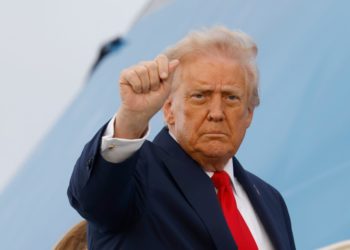The world’s market for vaccines, as it exists today, depends on the United States. The U.S. has poured immense resources into the design and development of vaccines, and has paid far higher prices for doses than most other nations can afford. The federal government has issued broad vaccine recommendations, generating strong, consistent demand. “That’s a predictable market,” Richard Hughes IV, a public-health-law expert and the former vice president of public policy at Moderna, told me. It’s also a huge one. Seth Berkley, the former CEO of Gavi, which supports the immunization of about half the world’s children, told me that the U.S. accounts for 35 to 40 percent of global vaccine revenue at a minimum, more than all of Europe combined.
But since the start of this year, when Robert F. Kennedy Jr.—one of the nation’s most prominent anti-vaccine activists—took charge of the Department of Health and Human Services, the federal government has signaled that it is no longer a reliable partner in the business of vaccines. The Trump administration has fired vaccine experts, tightened vaccine regulatory policies, restricted vaccine recommendations, and spread misinformation about vaccines’ harms. It has halted its funding of Gavi. It has canceled hundreds of contracts for vaccine research across multiple agencies. “Even before the change in policies that are being implemented now, vaccines were a difficult business,” Andrew W. Lo, an economist at MIT, told me. “It’s just become that much harder.”
In response, companies are paring back. Multiple vaccine makers suffering from the American government’s recent attacks have announced layoffs or a demerger of their vaccine division, as their stocks fall. These include Moderna, which HHS recently stripped of more than $700 million in grant funding for its pandemic-flu shots. Also among them is the Australian biotechnology company CSL, which sells two flu vaccines to the U.S. that contain thimerosal, a mercury-based preservative that Kennedy’s handpicked CDC vaccine-advisory panel recently recommended against, despite decades of evidence showing the additive is safe. (Last month, CSL noted that a recent dip in flu-vaccine uptake in the U.S. had put “competitive pressure” on its vaccine profit margin; a CSL spokesperson told me in an email that the company expects American vaccination rates to recover. Moderna declined to comment.) More instability is likely ahead. The CDC’s vaccine advisory panel meets again today and could vote to restrict guidance for several immunizations, including ones that protect infants against measles, mumps, rubella, chicken pox, and hepatitis B.
When reached for comment, an HHS spokesperson wrote over email that “Secretary Kennedy serves the American people, not the interests of Big Pharma,” adding that the department was “not limiting access to vaccines, but rather returning focus to the doctor-patient relationship.”
Legitimate critiques can be made of the pharmaceutical industry’s incentives and pricing strategies. But from a financial standpoint, vaccines have always been a bit of an underdog for pharmaceutical companies. As preventative products, designed for healthy people, they’re held to an especially high safety standard—a requirement that reliably drives up the expenses of development and testing—and they need to be widely accessible, which puts pressure on manufacturers to keep their price tags low. Individual vaccines are also used, at most, a few times over a lifetime—another cap on potential revenue. What’s more, “it’s very hard to charge money for something that patients don’t immediately need,” Lo told me: They might clamor for a new heart medication or cancer drug, but persuading healthy people to inject a foreign substance into their body can be trickier. Throughout the past half century, the vaccine industry has also been threatened repeatedly by lawsuits over potential vaccine side effects.
To their makers, then, vaccines are a big risk for a potentially low reward. That makes the market for them one of the most fragile in the pharmaceutical industry, Rajeev Venkayya, the former head of Takeda Pharmaceuticals’ vaccine unit, told me. Those realities have driven plenty of vaccine makers out of the market, experts told me—whether via mergers, bankruptcy, or strategic decisions to focus on other products. In 1967, 26 companies produced vaccines for the U.S.; by the mid-2000s, fewer than half a dozen were left—and the nation was staring down shortages of nine of the 12 childhood vaccines recommended at the time.
In the two decades since, the industry has rallied, Berkley told me, especially as profitable “blockbuster” vaccines, including pneumococcal vaccines, HPV vaccines, and, most recently, COVID-19 vaccines, have grown into billion-dollar markets or more in the United States. The U.S.’s deep pockets helped—as Berkley pointed out, the federal government pays about 20 times what Gavi does for pneumococcal vaccines—but so did federal policies that have increased incentives and lowered risks for manufacturers. And when the public’s trust in vaccines has been threatened, often the government has emphasized that American immunizations have been well vetted and urged the public to continue getting them, Jesse Goodman, who served as the FDA’s chief scientist until 2014, told me.
Now the Trump administration is doing essentially the opposite—most dramatically, so far, for COVID vaccines. Trump’s FDA has limited who can access the shots and made seeking approval for new versions more difficult. The CDC has also muted its COVID-vaccine guidance. Every expert I spoke with for this story expected more changes to the regulatory pipeline that all vaccines must pass though. And the people Kennedy has chosen to oversee vaccine policy and sit on the CDC’s vaccine-advisory commitee—COVID contrarians and vocally anti-vaccine researchers—are making the U.S. a highly unappealing market for all vaccine makers, experts told me.
Without clear, strong recommendations, demand will likely be uneven, making it difficult for manufacturers to estimate how much product to make; without vaccine experts using evidence to advise the government, companies can’t trust that the clinical-trial data they produce, vouching for vaccine safety and performance, will be fairly or accurately assessed. Across the National Institutes of Health and the Biomedical Advanced Research and Development Authority, Trump officials have also defunded billions of dollars’ worth of vaccine-related grants. That includes half a billion specifically for mRNA-based vaccines—jeopardizing the development of future immunizations, including those designed to protect against pandemic flus. And new roadblocks in the approval process will hinder companies trying to bring products to market, making the up-front costs of research, development, and testing that much bigger a gamble. “All of this creates more chaos and uncertainty for vaccine manufacturers,” Grace Lee, a pediatrician and a former chair of ACIP, told me. “Why would you take these additional risks, where it is not clear from week to week what will happen?”
Large, long-established pharmaceutical companies with wide-ranging drug portfolios will likely have the resources to weather a dip in demand. But smaller biotechnology companies, which already tend to operate on thin margins, “will get out of the business,” Lo told me—which, in turn, will likely discourage other vaccine-focused companies from starting up. Venture capitalists have taken note of the circumstances: “The sense right now is that the market’s going to be unstable,” Berkley told me. “This is not the time to invest heavily in new or better products.”
The Trump administration could also nudge companies to exit the vaccine business by making them more vulnerable to legal risk. Most immediately, Kennedy could rescind a pandemic-era declaration that has protected COVID-vaccine manufacturers from excessive liability. He has also announced his intention to amend the Vaccine Injury Compensation Program, which experts worry could take the U.S. back to a time when lawsuits nearly destroyed the vaccine market. Congress established the VICP in the 1980s, after a flood of litigation against the makers of a pertussis vaccine persuaded all but one company supplying the U.S. to stop selling it. (The lawsuits were spurred in part by since-debunked claims that the vaccine caused permanent brain damage.) Today, the program simultaneously acknowledges the rare but very real side effects of vaccines, and gives vaccine makers an important liability shield. Funded by a tax on manufacturers, it offers compensation for certain vaccine injuries that are already backed by evidence; other claims are heard in a kind of vaccine court. Major alterations to the program, Anna Kirkland, the author of the book Vaccine Court, told me, would require Congress to act. Still, some experts told me they fear that Kennedy could push for autism to be added to the list of compensable vaccine injuries, as part of his effort to advance the debunked narrative that vaccines cause the condition. That change could flood the program with claims, rapidly drain it, and give manufacturers another reason to pull away from making vaccines.
The exit of even just a handful of manufacturers from the U.S. market could mean shortages of certain vaccines, on disastrously quick timelines. In 2004, for instance, the U.S. lost half of its supply of seasonal flu vaccine after one of the country’s two flu-shot manufacturers at the time, Chiron, temporarily shut down one of its factories because of potential contamination. Several vaccines on the American childhood immunization schedule still rely on only one or two manufacturers, Goodman told me. Among them are the shots that guard against HPV, varicella, and rotavirus.
A wind-down in vaccine manufacturing for the U.S. wouldn’t just invite outbreaks of known diseases. The country would also be exceptionally ill-equipped to respond to the next pandemic. Manufacturers managed to debut the world’s first COVID-19 vaccines in less than a year—a record—because the government was eager to fund their development and because companies could trust that the government would buy them. That mRNA vaccines would arrive first was never a foregone conclusion, either; Operation Warp Speed succeeded in part because federal agencies offered resources to a wide range of vaccine companies. Several of the experts I spoke with agreed: If a new pandemic were to ignite in the current climate, “Operation Warp Speed Part 2 would not operate at warp speed,” Lo said.
If the U.S. vaccine market shrinks, it can rebound, as it has before. But the amount of time that will take, experts told me, will depend heavily on just how thoroughly vaccine infrastructure is dismantled. Already, the scale of destruction is unlike any they have ever seen before. Perhaps, if the world is fortunate, demand and supply will rebound within a couple of years, Goodman said. But if manufacturers go out of business, if factories close, if some vaccines have their licenses entirely stripped, rebuilding could take decades. For now, most Americans continue to strongly support vaccination. But if Kennedy and the rest of the Trump administration succeed in draining the U.S. of its vaccine supply, Americans could soon be forced into a position where they cannot access immunizations—no matter how badly they may want them.
The post How RFK Jr. Could Eliminate Vaccines Without Banning Them appeared first on The Atlantic.




